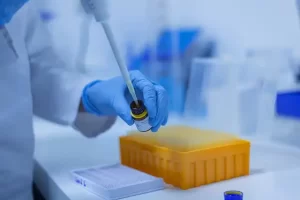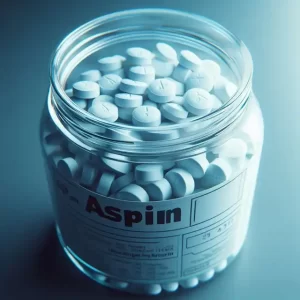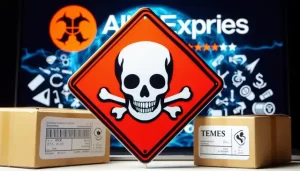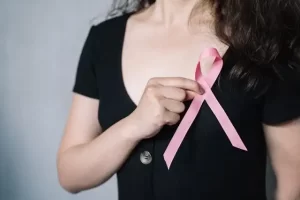How long does it take to safely stop immunotherapy?
- Early Biomarker for Multiple Sclerosis Development Identified Years in Advance
- Aspirin Found Ineffective in Improving Recurrence Risk or Survival Rate of Breast Cancer Patients
- Child Products from Aliexpess and Temu Contain Carcinogens 3026x Over Limit
- Daiichi Sankyo/AstraZeneca’s Enhertu Shows Positive Results in Phase III DESTINY-Breast06 Clinical Trial
- Mn007 Molecules Offer Potential for Combating Streptococcus pyogenes Infection
- Popular Indian Spices Banned in Hong Kong Over Carcinogen Concerns
How long does it take to safely stop immunotherapy? Do you need to take medicine for a long time?
- AstraZeneca Admits for the First Time that its COVID Vaccine Has Blood Clot Side Effects
- Was COVID virus leaked from the Chinese WIV lab?
- HIV Cure Research: New Study Links Viral DNA Levels to Spontaneous Control
- FDA has mandated a top-level black box warning for all marketed CAR-T therapies
- Can people with high blood pressure eat peanuts?
- What is the difference between dopamine and dobutamine?
- How long can the patient live after heart stent surgery?
JAMA Oncology: How long does it take to safely stop immunotherapy? Do you need to take medicine for a long time?
Immunotherapy drugs have shown good anti-tumor activity and controllable adverse reactions in a variety of cancer treatments, and have gradually become a new hope for the treatment of cancer patients.
In recent years, the approval and marketing of immunotherapy drugs and the accumulation of clinical research data have gradually improved the status of immunotherapy in comprehensive cancer treatment.
The main mechanism of immunotherapy is to kill tumor cells by activating the autoimmune system of tumor patients by releasing T cell immunosuppressive signals.
Extensive and well-studied ICIs include monoclonal antibodies targeting cytotoxic T lymphocyte antigen 4 (CTLA-4) and programmed death protein (PD-1)/ligand-1 (PD-L1).
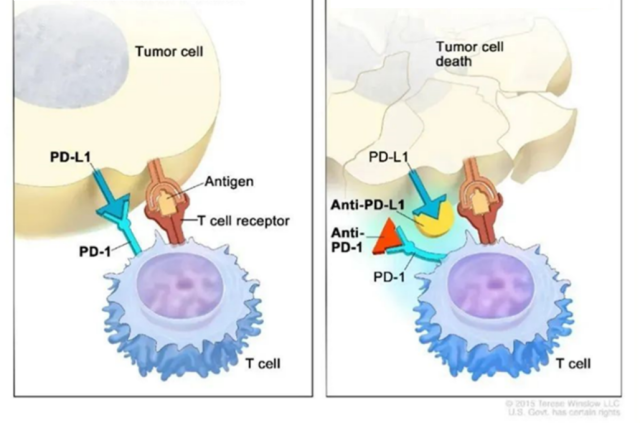
PD-1/PD-L1 inhibitors reactivate T cells
Unlike the rapid progression after discontinuation of targeted therapy, immunotherapy has a unique “smearing effect”, which allows the tumor to continue to respond after the patient has stopped receiving immunotherapy.
However, for patients, when to stop the immunotherapy after it takes effect is also an urgent problem to be solved.
Generally speaking, the drug is stopped only when the disease progresses and drug resistance occurs. However, tumor treatment drugs are expensive, and they are a heavy burden for most patients and families.
Therefore, stopping the drug as soon as possible while ensuring the curative effect is a problem that patients are more concerned about.
Domestic and foreign guidelines recommend that once PD-1/PD-L1 inhibitors take effect, they should be used for 2 years; after radical treatment (such as surgery, concurrent chemoradiotherapy, etc.), PD-1/PD-L1 should be used as adjuvant therapy When, the use time is 1 year.
So, does immunotherapy have to be used for 2 years before stopping the drug?
Recently, at the 2023 American Society of Clinical Oncology (ASCO) annual meeting, a new study from the Abramson Cancer Center of the University of Pennsylvania answered this clinical problem: Patients with advanced NSCLC who received immune monotherapy or immune + chemotherapy regimens, immunotherapy 2 Discontinuing the drug after 2 years will not affect the overall survival of the patients . This has great clinical guiding significance for patients.
The results of the analysis were simultaneously published in JAMA Oncology.
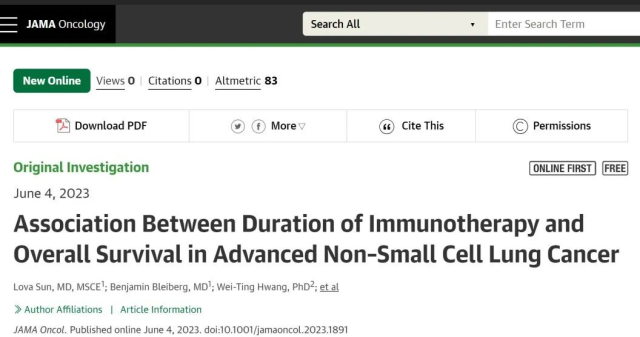
The research team from the Abramson Cancer Center of the University of Pennsylvania retrospectively collected 706 eligible patients from 2016 to 2021 (driver gene negative, first-line immune monotherapy/immune + chemotherapy combination therapy, and the duration of immunotherapy ≥ 700 days, still no disease progression).
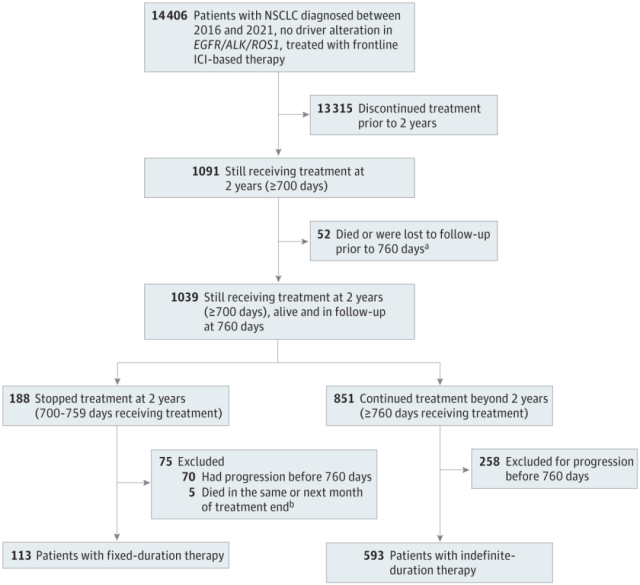
And according to the situation of drug use, they were divided into two groups for analysis;
One group of 113 patients: received immunotherapy for 2 years (700-759 days), then stopped the drug and did not continue to use it;
Another group of 593 patients: receiving immunotherapy for ≥760 days;
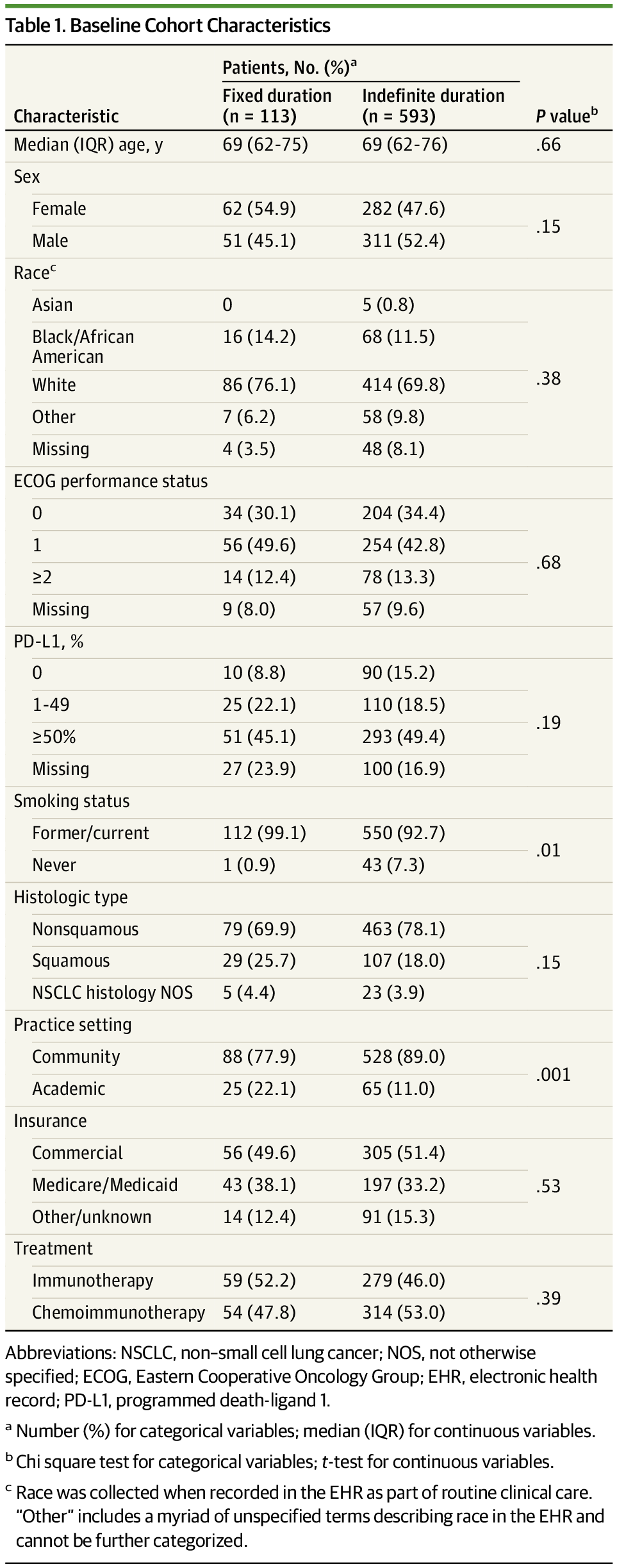
Patient’s baseline characteristics
Counting from the “difference point” of immunotherapy for 2 years, the median follow-up time was 14.0 months (range 0.1-50.9 months), and there was no significant difference in overall survival between the two groups.
imageSurvival curves of two groups of patients
The 3-year survival rates of the two groups were 89% vs 91%; the 4-year survival rates of the two groups were 79% vs 81%;
Whether it was univariate analysis or multivariate analysis, there was no statistical difference in the survival rate between the two groups (HR across 1, P value> 0.05).
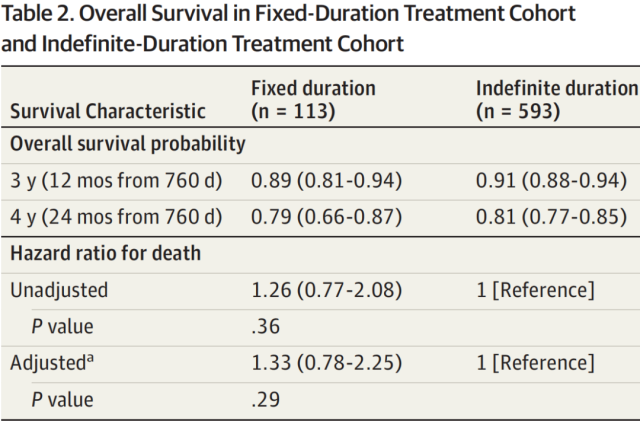
The survival rate of the two groups
In addition, for 11 patients with disease progression, the median second progression-free survival (PFS2) after immunotherapy (8 cases were single-drug rechallenge, 3 cases were combination therapy) was 8.1 months. This shows that immunotherapy is still feasible for patients with disease recurrence after drug withdrawal:
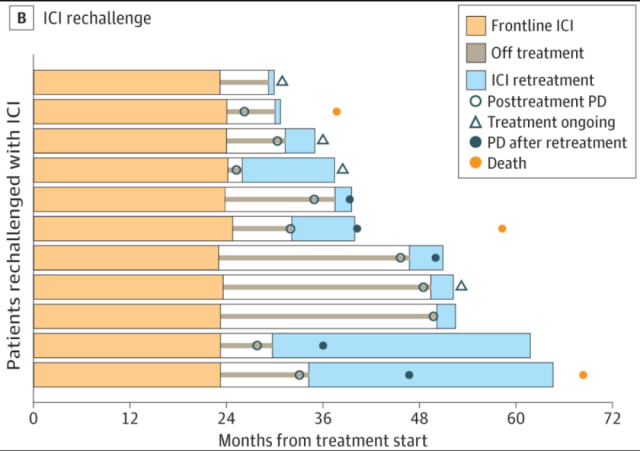
Immunotherapy effect
The analysis of this study well shows that immunotherapy drugs are not used as long as possible;
In clinical practice, scientific guidance of clinical medication is needed to make safer and more favorable treatment choices for patients.
references:
Sun L, Bleiberg B, Hwang WT, et al. Association Between Duration of Immunotherapy and Overall Survival in Advanced Non–Small Cell Lung Cancer[J]. JAMA Oncology, 2023.
How long does it take to safely stop immunotherapy? Do you need to take medicine for a long time?
(source:internet, reference only)
Disclaimer of medicaltrend.org
Important Note: The information provided is for informational purposes only and should not be considered as medical advice.
